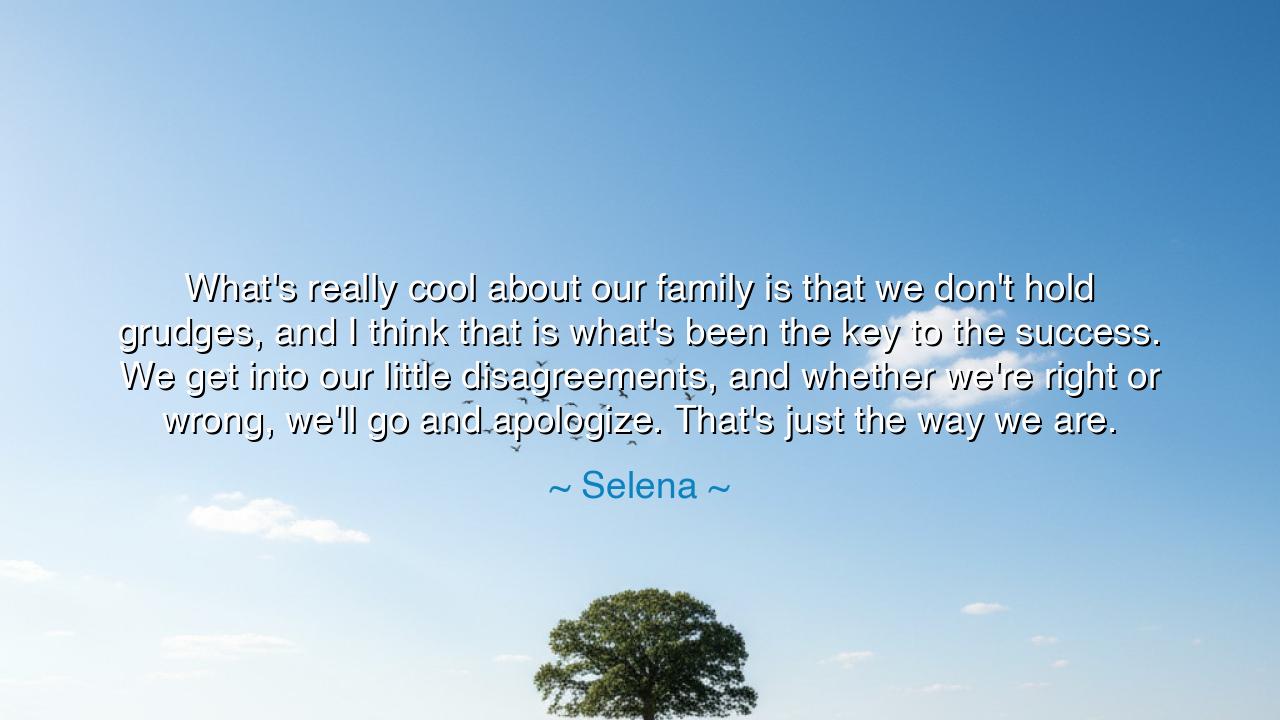
What's really cool about our family is that we don't hold
What's really cool about our family is that we don't hold grudges, and I think that is what's been the key to the success. We get into our little disagreements, and whether we're right or wrong, we'll go and apologize. That's just the way we are.






Opening Scene
The evening light softly spills through the windows, casting long shadows across the living room. The faint hum of the city outside is barely audible, leaving only the quiet sound of Jack and Jeeny’s conversation filling the room. They sit across from each other at the kitchen table, mugs of tea in hand, the warmth of the mugs contrasting with the cool breeze that drifts in through the open window. Their voices are calm, but there’s an undercurrent of something deeper, something more personal, in their words.
Host: The room is filled with the quiet of the evening, as though the world outside has faded, leaving only the two of them and the thoughts they’re sharing. The soft click of Jack’s mug on the table is the only sound that breaks the silence. Jeeny’s gaze is thoughtful, her eyes fixed on him as if waiting for him to reflect on something she’s just said.
Jeeny: (her voice gentle, almost reflective) “You know, I was thinking about something Selena said once. She said, ‘What’s really cool about our family is that we don’t hold grudges, and I think that is what’s been the key to the success. We get into our little disagreements, and whether we’re right or wrong, we’ll go and apologize. That’s just the way we are.’ Isn’t that such an interesting way to look at conflict?”
Jack: (his voice thoughtful, slightly amused) “It really is. There’s something incredibly healthy about that approach — not holding onto grudges, not letting things build up. It’s about being able to disagree, but not letting the disagreement define you or the relationship. It sounds so simple, but it’s hard for a lot of people to do.”
Jeeny: (nodding slowly, her tone reflective) “Exactly. It’s not about avoiding conflict or pretending that everything’s always perfect. It’s about resolving the conflict quickly, taking responsibility for your part, and moving forward with grace. That’s what makes it so powerful. It’s the willingness to say ‘I’m sorry’ and let go, even when you’re not sure if you’re right or wrong.”
Host: The stillness in the room deepens, like the weight of the conversation has settled in. Jack’s gaze softens, and Jeeny looks at him with understanding, as though both are reflecting on the deeper meaning of the words they’re sharing. The light from the window fades into the soft glow of the lamps around them, adding to the feeling of warmth and connection.
Jack: (his voice softer, more introspective) “I think we all hold onto things more than we realize. We get stuck in our pride, in the idea that we’re right or that we don’t want to apologize. But the way Selena talks about it — it’s like the apology itself isn’t the point. It’s the willingness to move on, to release whatever negativity is tying you to the past. To free yourself from the weight of resentment.”
Jeeny: (smiling gently, her voice full of understanding) “Yes, exactly. Apologizing isn’t about admitting that you’re wrong, it’s about recognizing that the relationship, the peace, is more important than being right. It’s about letting go of the negative emotions so you can both grow, together.”
Host: The room feels lighter now, the weight of their conversation lifting like a gentle release. The quiet between them holds a new sense of clarity — the understanding that holding grudges only weighs us down, while forgiveness frees us. The soft sound of the city outside continues, but inside, everything feels still, as if they’ve touched on something both simple and profound.
Jack: (with a small, thoughtful smile) “I think the reason families — or any relationship, really — succeed isn’t because they avoid disagreements. It’s because they can go through them without letting them linger. They can disagree, get upset, but then they forgive and keep moving forward. That’s the key to lasting connections.”
Jeeny: (nodding, her voice affirming) “Exactly. It’s not about being perfect, or always agreeing. It’s about how you handle those bumps in the road. The ability to let go, to apologize, and to forgive is what keeps the connection alive.”
Host: The evening stretches on, and the conversation moves into a comfortable rhythm. The room is filled with a sense of understanding, a quiet peace that comes from realizing the true strength in forgiveness and letting go. Jack and Jeeny sit together, knowing that the most important relationships are the ones where people can be real, can disagree, but ultimately choose to move forward together, without the weight of grudges. The soft glow of the room seems to echo the warmth of the realization — that love and peace are built on the willingness to release, to apologize, and to forgive.
Jack: (smiling, his voice light) “I think I see now. It’s not the disagreement that matters. It’s how you handle it afterwards — how you release the tension and move forward with an open heart.”
Jeeny: (with a quiet smile) “Yes. And that’s the beauty of it. When you choose to let go, you make room for growth and understanding.”
Host: The world outside continues its usual pace, but inside, Jack and Jeeny sit in a moment of quiet clarity, understanding that the real power of connection lies in the ability to forgive, to release, and to always keep moving forward, together.






AAdministratorAdministrator
Welcome, honored guests. Please leave a comment, we will respond soon